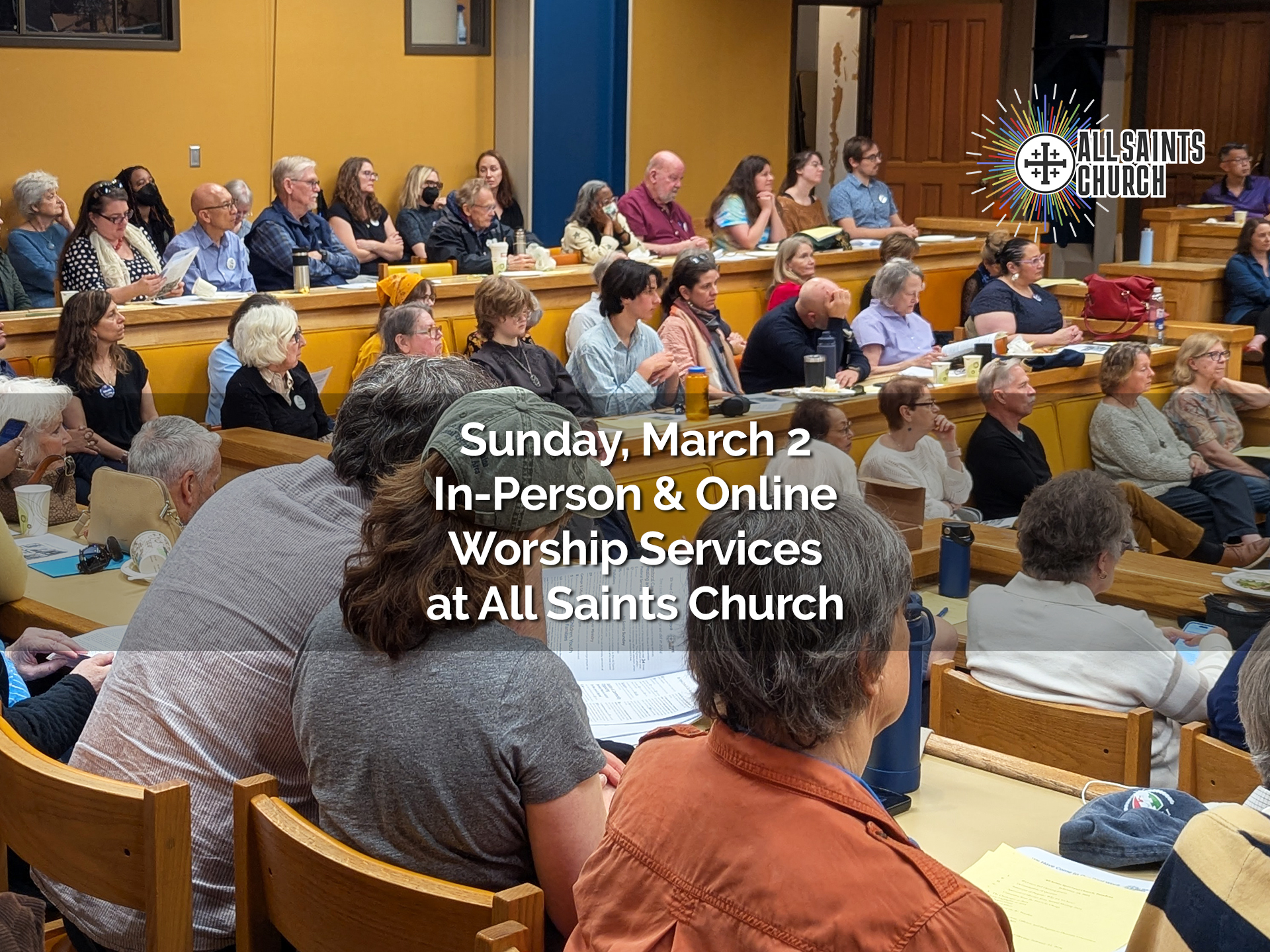“I believe we left Austin a sanctuary church with expansive language and marriage for all precisely because we are becoming more fully the Episcopal branch of the Jesus Movement we have been challenged to be.”
Sermon by Susan Russell at All Saints Church, Pasadena, on Sunday, July 15, 2018.
“Grant that we may know and understand what things we ought to do, and also may have grace and power faithfully to accomplish them. Amen.”
=========
This prayer – the Collect for the Day today, Proper 10 — is my favorite prayer in the entire prayer book … and so I considered it a sign of the beneficence of the lectionary gods when I discovered it was the one appointed for today — this First Sunday After the 79th General Convention of the Episcopal Church — as I wrote this sermon yesterday on Southwest Flight 4390 from Dallas to Burbank.
While it arguably sums in general up what it is to live a life of faith in specific it is exactly the charge several thousand Episcopalians lived out over the last two weeks at as we gathered in Austin for our triennial three ring circus of liturgy, legislation and shopping: asking God to help us understand what things we ought to do … and then give us the grace and power to do them.
For anyone who missed the memo, General Convention is how the Episcopal Church governs itself through a bicameral legislative process that meets every three years and gives equal weight to the voices of bishops, clergy and laity on everything from what our public policy will be on a wide range of social issues to how we will govern the inner-workings of the church through our canons, processes and procedures to what words we will pray as a people of common prayer in our book of common prayer.
This year — as always — our agenda was dense, diverse and daunting and the pre-convention buzz was full of anticipation, angst and anxiety. In addition to addressing the ongoing challenges of dismantling racism, advocating for climate justice and figuring out how to proclaim the Good News of God’s inclusive love (AKA evangelism) we were considering if — and if so, how — to embark on a process of revising our book of common prayer … last updated in (wait for it) 1979.
We were challenged by a special committee convened by the President of the House of Deputies to consider how the church has been complicit in sexual harassment and exploitation — inspired by the #MeToo Movement — and resolutions calling for accounting for the past and accountability in the future.
We were given opportunities to continue our witness to end gun violence, to stand with immigrants and refugees — especially the families being heartbreakingly separated at our borders — and to continue to wrestle with how to be agents of peace in the seemingly intractable struggle in the Middle East.
Oh … and we were once again trying to move the needle forward and turn the promise of “full and equal claim” made to LGBTQ Episcopalians in 1976 from a resolution to a reality by ending the de facto sacramental apartheid in eight dioceses still refusing to provide access to marriage liturgies for same-sex couples.
Our “help us understand what things we ought to do” list included 517 resolutions and nine days of legislative sessions — preceded by several days of open hearings and committee meetings.
Since this is a sermon and not a lecture on General Convention I’m going to leave the details on all of that — as fascinating as they are — to a written debrief I’ll be posting on the website later this week and to the post-convention education offering my partner-in-General-Convention-Crime Jim White and I will be offering later this summer.
Let me sum up with this verbatim from a clergy colleague from the Diocese of New York … who turned to me as we were waiting together for the “walk” sign on the curb in front of the Convention Center: “So now we’re a sanctuary church with expansive language and marriage for all. How did THAT happen?”
It happened because when several thousand Episcopalians gathered in Austin for ten days of legislation, liturgy and shopping we stood on the shoulders of decades of prophets who have done what prophets have done for as long as there have been prophets: Prophets like Amos — who in this morning’s lesson said that God told him that he was giving him a plumb line – which I’m sure is a great metaphor if you know what a plumb line is.
What I’ve suggested before from this pulpit — and repeat this morning — is that for me a better 21st century metaphor for what God gave Amos is not a plumb line but a satellite signal connecting you to the God of love and justice and compassion as a spiritual GPS.
And the Episcopal Church got its spiritual GPS recalculated in this introductory message from our Presiding Bishop Michael Curry — who challenged us to stay as focused on Jesus as Starbucks is focused on coffee. “The closer we are to our roots,” he said “the closer we are to the source of our very life … we will find strength to meet the days ahead. We will find the wisdom and the courage and the creativity necessary to engage the present historical moment.”
I believe we left Austin a sanctuary church with expansive language and marriage for all precisely because we are becoming more fully the Episcopal branch of the Jesus Movement we have been challenged to be: because we are truly striving to be a church where love truly is the way — where whoever you are and wherever you find yourself on the journey of faith there is a place for you here.
To be a church where — to continue the Starbucks analogy — whether you’re a double espresso or a mocha frappuccino … or a grande drip with room for cream … there’s plenty good room for everybody.
“Grant that we may know and understand what things we ought to do, and also may have grace and power faithfully to accomplish them.”
What does it mean to live a life of faith aligned with this Jesus Movement? Hear these words preached by Bishop Jennifer Baskerville-Burrows at our closing Eucharist :
Practicing the way of love in Jesus means it becomes difficult to be witness to a sexist joke and let it go, or to overhear an unchecked comment that reinforces hateful stereotypes and just let that go. Or to absorb the racist micro aggression and let it pass because “they really didn’t mean it” or you’re just too tired to have to say something again. It bears repeating that God’s dream for us isn’t politically correct appeasement — God’s dream for humanity is not that small. The erasure of hatred, and white supremacy, and misogyny, and homophobia, and xenophobia from human hearts so that we might turn to love, is a matter of normalizing love because of, not in spite of difference — that is the beginning of God’s dream.
A matter of normalizing love because of, not in spite of, difference. That can feel like an overwhelming challenge when we wake up every morning assaulted by division and polarization and worldview dominated by a zero-sum gain mentality demanding heads on a platter as surely as Herodias demanded John’s in this morning’s horrifying Gospel. My brothers, sisters and gender non-conforming siblings: we are not a heads on a platter people … we are a hearts for Jesus people … committed to resisting the evil we deplore while refusing to become it.
And now – in spite of my earlier disclaimer about not going into details on legislative issues — I do want to claim a “moment of personal privilege” and the movement forward on marriage. The question on the table in Austin was never whether there is a place for traditionalists with a minority opinion on marriage equality in the Episcopal Church. It was whether those holding that minority theological perspective should have the power to deny access to the sacrament of marriage to couples seeking God’s blessing on their marriage. And the answer we came back with was a resounding “No.”
What a difference a decade or two makes.
We have gone from being a church where simply acknowledging the existence of same-sex couples in our midst was a controversial and deeply divisive issue to being a church where an overwhelming majority embraced marriage for all, ending what was de facto sacramental apartheid for same-sex couples in some dioceses.
Yes, there is still work to do. Our canons have been changed and our liturgies have been authorized and yet we still have a book of common prayer that describes marriage in binary language. And we have been ordaining women since 1974 and the same prayer book still contains male pronouns in the ordination service. And because language matters we will keep coming back — like the persistent widow — asking God to give us both grace and power to accomplish the work we have been given to do.
But right now we celebrate the incremental victories on the road to the audacious goal of the Beloved Community where there are no strangers at the gate and all are gathered fully into the embrace of the God who loves them beyond their wildest imaginings.
We celebrate the moment on the floor of convention when we realized the affirming guiding principles for the inclusion of transgender and non-binary was going to be adopted without a single deputy stepping to a microphone to oppose it.
We celebrate the email from couples in the Diocese of Tennessee who after years of waiting can now plan a December wedding in their own parish with their own priest presiding — and the text message from a bishop who wrote: “Thank you for keeping the pressure on all of us. It let us do the right thing in an imperfect way.”
And we celebrate the deputy who reported that a Lyft driver taking her home — upon finding out she’s been at the General Convention — said “Thank you. I saw in the news your church stands with immigrants. You let us know we matter.”
“Grant that we may know and understand what things we ought to do, and also may have grace and power faithfully to accomplish them.”
That prayer for the whole church is also a prayer for this church – this All Saints Church – this Pasadena twig on the Episcopal branch of the Jesus Movement. In the days and weeks and months ahead may we continue to pray it as we seek God’s call to us to use love to change the world in the name of the one who created it in love. And now, let me close with a few more words from Bishop Baskerville-Burrows:
Movements move. Movements move.
There are decisions we make moment by moment
to live a particular way and this is our moment.
This is our time.
If we were ever called to claim the counter cultural Christian mantle
that is about turning the world upside down
so that we can normalize love instead of hate — it is now.
Right now. You know the way.
You know what to do. You have totally got this.
Now go!
The Deputy from Los Angeles yields the floor.



